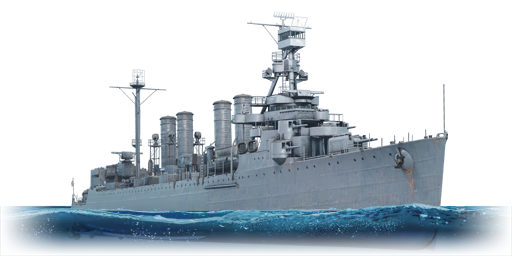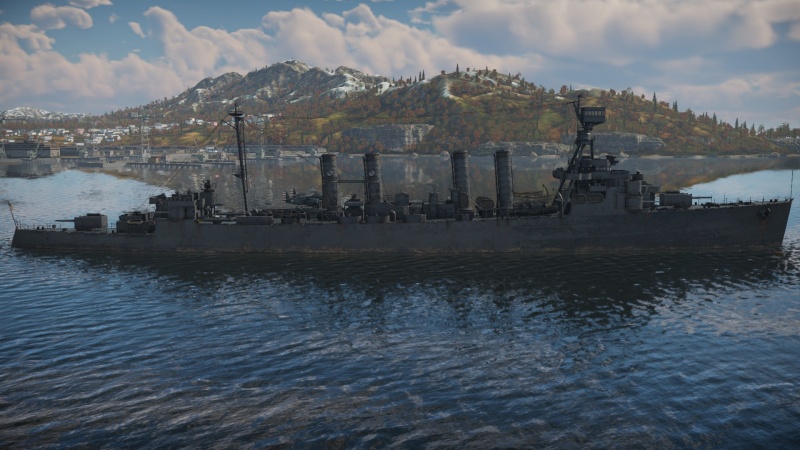Difference between revisions of "USS Detroit"
R_nminbiY_n (talk | contribs) (manufacturer template) |
(Wrote the Scout plane section, added to Pro. also added to weapons info) |
||
| Line 35: | Line 35: | ||
<!-- ''Provide information about the characteristics of the primary armament. Evaluate their efficacy in battle based on their reload speed, ballistics and the capacity of their shells. Add a link to the main article about the weapon: <code><nowiki>{{main|Weapon name (calibre)}}</nowiki></code>. Broadly describe the ammunition available for the primary armament, and provide recommendations on how to use it and which ammunition to choose.'' --> | <!-- ''Provide information about the characteristics of the primary armament. Evaluate their efficacy in battle based on their reload speed, ballistics and the capacity of their shells. Add a link to the main article about the weapon: <code><nowiki>{{main|Weapon name (calibre)}}</nowiki></code>. Broadly describe the ammunition available for the primary armament, and provide recommendations on how to use it and which ammunition to choose.'' --> | ||
{{main|6 inch/53 Mk.12 (152 mm)}} | {{main|6 inch/53 Mk.12 (152 mm)}} | ||
| − | + | The one saving grace of this ship is its 6 inch artillery. Powerful enough to obliterate most destroyers in a few well placed hits, it unfortunately has a poor reload rate, and an even worse traverse rate. This vessel is essentially a support ship for more powerful ships in its BR range. | |
| − | |||
=== Secondary armament === | === Secondary armament === | ||
| Line 43: | Line 42: | ||
{{main|3-inch Mark 10 (76 mm)}} | {{main|3-inch Mark 10 (76 mm)}} | ||
| − | + | The 3 inch (76 mm) cannons do have HE-VT shells, meaning that they can ward off planes and ships, but only at close range. | |
=== Anti-aircraft armament === | === Anti-aircraft armament === | ||
| Line 50: | Line 49: | ||
{{main|1.1 inch/75 Mk.1 (28 mm)|20 mm/70 Oerlikon Mk.II (20 mm)}} | {{main|1.1 inch/75 Mk.1 (28 mm)|20 mm/70 Oerlikon Mk.II (20 mm)}} | ||
| − | + | The Raleigh is equipped with one Chicago Piano mount and eight single-mount Oerlikon cannons. This provides some decent AA cover at close range, though it certainly isn't winning any awards for defensive firepower. It is better to simply stay close to AA ships and destroyers for some extra protection. | |
=== Additional armament === | === Additional armament === | ||
| Line 57: | Line 56: | ||
{{main|Mk.15 (533 mm)}} | {{main|Mk.15 (533 mm)}} | ||
| − | '' | + | The ship does have a pair of torpedo launchers, but their poor placement and poor torpedoes, makes them a poor choice to use. |
| + | === Scout Seaplane === | ||
| + | Located midship are two catapults with one '''Curtiss SOC-1''' scout plane each which provides unique offensive and defensive abilities, expanding tactical options. Ship launched scout planes fly just like regular tree units but lack munition choice and cockpit views as of this writing. With the typical ability of staffing (but with only one machine gun), dropping 2 x 100 lb bombs, and capping zones, plus the added ability to lay down smoke cover (up to 3 times). Captains will be wise to remember this ability and consider when best to use, for example early or late in match to cap a point, use smoke screen to stymie enemy bombardment and repair, or attack enemy units instead, or perhaps something completely new! With two seaplanes one can risk a cap attempt at beginning of match, saving the second for any opportunity that presents itself | ||
== Usage in battles == | == Usage in battles == | ||
| Line 70: | Line 71: | ||
* Above average mobility (63 km/h) | * Above average mobility (63 km/h) | ||
* Decent firepower | * Decent firepower | ||
| + | * Two scout seaplanes | ||
'''Cons:''' | '''Cons:''' | ||
Revision as of 02:15, 19 December 2021
| This page is about the American light cruiser USS Detroit. For other Omaha-class cruisers, see Omaha (Family). |
Contents
Description
The Omaha-class, USS Detroit (CL-8), 1942 is a premium gift rank III American light cruiser with a battle rating of 5.0 (AB/RB/SB). It was introduced during Update "Red Skies" as a reward for Battle Pass: Season IV, "Fearless Voltigeur".
General info
Survivability and armour
Talk about the vehicle's armour. Note the most well-defended and most vulnerable zones, e.g. the ammo magazine. Evaluate the composition of components and assemblies responsible for movement and manoeuvrability. Evaluate the survivability of the primary and secondary armaments separately. Don't forget to mention the size of the crew, which plays an important role in fleet mechanics. Save tips on preserving survivability for the "Usage in battles" section. If necessary, use a graphical template to show the most well-protected or most vulnerable points in the armour.
Mobility
Write about the ship's mobility. Evaluate its power and manoeuvrability, rudder rerouting speed, stopping speed at full tilt, with its maximum forward and reverse speed.
| Mobility Characteristics | |||
|---|---|---|---|
| Game Mode | Upgrade Status | Maximum Speed (km/h) | |
| Forward | Reverse | ||
| AB | |||
| Upgraded | 73 | 29 | |
| RB/SB | |||
| Upgraded | 63 | 25 | |
Modifications and economy
Armament
Primary armament
The one saving grace of this ship is its 6 inch artillery. Powerful enough to obliterate most destroyers in a few well placed hits, it unfortunately has a poor reload rate, and an even worse traverse rate. This vessel is essentially a support ship for more powerful ships in its BR range.
Secondary armament
The 3 inch (76 mm) cannons do have HE-VT shells, meaning that they can ward off planes and ships, but only at close range.
Anti-aircraft armament
The Raleigh is equipped with one Chicago Piano mount and eight single-mount Oerlikon cannons. This provides some decent AA cover at close range, though it certainly isn't winning any awards for defensive firepower. It is better to simply stay close to AA ships and destroyers for some extra protection.
Additional armament
The ship does have a pair of torpedo launchers, but their poor placement and poor torpedoes, makes them a poor choice to use.
Scout Seaplane
Located midship are two catapults with one Curtiss SOC-1 scout plane each which provides unique offensive and defensive abilities, expanding tactical options. Ship launched scout planes fly just like regular tree units but lack munition choice and cockpit views as of this writing. With the typical ability of staffing (but with only one machine gun), dropping 2 x 100 lb bombs, and capping zones, plus the added ability to lay down smoke cover (up to 3 times). Captains will be wise to remember this ability and consider when best to use, for example early or late in match to cap a point, use smoke screen to stymie enemy bombardment and repair, or attack enemy units instead, or perhaps something completely new! With two seaplanes one can risk a cap attempt at beginning of match, saving the second for any opportunity that presents itself
Usage in battles
While using the USS Detroit, try to exploit its mobility advantage and flank around the map. Use cover to make up for the subpar armour of the ship. When playing this ship, make sure you avoid higher-tier cruisers like IJN Mogami, HMS London or Admiral Hipper and go for destroyers and lower-tier cruisers.
Pros and cons
Pros:
- Above average mobility (63 km/h)
- Decent firepower
- Two scout seaplanes
Cons:
- Anti-aircraft armament struggles to land hits
- Poor armour
- Low crew count
History
Describe the history of the creation and combat usage of the ship in more detail than in the introduction. If the historical reference turns out to be too long, take it to a separate article, taking a link to the article about the ship and adding a block "/History" (example: https://wiki.warthunder.com/(Ship-name)/History) and add a link to it here using the main template. Be sure to reference text and sources by using <ref></ref>, as well as adding them at the end of the article with <references />. This section may also include the ship's dev blog entry (if applicable) and the in-game encyclopedia description (under === In-game description ===, also if applicable).
Media
- Videos
See also
Links to articles on the War Thunder Wiki that you think will be useful for the reader, for example:
- reference to the series of the ship;
- links to approximate analogues of other nations and research trees.
External links
| Bethlehem Steel Corporation | |
|---|---|
| Gun Destroyers (DD) | |
| Porter-class | USS Phelps · USS Moffett |
| Fletcher-class | USS Cowell |
| Destroyer Leaders (DL) | |
| Mitscher-class | USS Wilkinson |
| Cruiser, Light (CL) | |
| Omaha-class | USS Raleigh · USS Detroit |
| Heavy Cruisers (CA) | |
| Northampton-class | USS Northampton |
| Portland-class | USS Portland |
| Baltimore-class | USS Baltimore · USS Pittsburgh |
| Des Moines-class | USS Des Moines |
| USA light cruisers | |
|---|---|
| Omaha-class | USS Detroit · USS Raleigh · USS Trenton |
| Atlanta-class | USS Atlanta |
| Brooklyn-class | USS Brooklyn · USS Helena |
| Cleveland-class | USS Cleveland |
| Fargo-class | USS Fargo |
| Worcester-class | USS Roanoke |
| USA premium ships | |
|---|---|
| Motor torpedo boats | PT-3 · PT-109 · PT-174 · Thunderbolt (PT-556) · PT-658 · PT-811 |
| Motor gun boats | LCM(6) Zippo · USS Douglas |
| Sub-chasers | Carmi (PC-466) |
| Destroyers | USS Welborn C. Wood · USS Wilkinson · USS Bennion · USS Cowell · USS Davis · USS Moffett · USS Phelps · USS Frank Knox |
| Light cruisers | USS Detroit · USS Helena |
| Heavy cruisers | USS Des Moines |
| Battleships | USS Arkansas |





